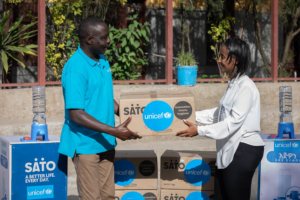UNICEF’s Make a Splash! Expands Hygiene Access for 5.6 Million

Since 2018, UNICEF’s Make a Splash! campaign has sought to expand access to clean water for those who need it most. The partnership with LIXIL has managed to improve sanitation conditions for 5.6 million people in 2022 alone. Here is some information about this campaign and how it is changing the lives of countless people in developing countries.
What is the Make a Splash! Campaign?
UNICEF’s partnership with LIXIL, a Tokyo-based organization of companies manufacturing plumbing equipment, has proved wildly successful since its initial launch in 2018. The campaign aims to increase the accessibility of clean water in six countries: India, Indonesia, Kenya, Ethiopia, Nigeria and Tanzania.
The Make a Splash! campaign pursues a number of different avenues to accomplish its goals, including the endorsement of government policies expanding access to clean water, the installation of plumbing fixtures and sanitation training. The partnership is designed to take definitive action toward the World Health Organization’s Sustainable Development Goals (SDGs) in access to sanitation services.
By the Numbers
In 2022, Make a Splash! provided nearly 3 million people with access to sanitation services and 2.7 million with access to hand-washing facilities. Much of this was accomplished through the installation of SATO equipment, a subsidiary of LIXIL focused on manufacturing accessible hygiene products
Additionally, the program trained more than 300,000 stakeholders on safe and effective sanitation practices. Make a Splash! also improved a number of information systems relating to sanitation and endorsed government policies increasing sanitation access, and strengthening hygiene infrastructure in the long run.
Long-Term Impacts
The program emphasizes innovation in sanitation technologies, with the goal of increasing sustainability in the hygiene industry. The partnership with LIXIL sets a standard of accessibility and affordability of sanitation products and services, making a large impact not only on the quality of life in these areas but also on the sanitation industry itself. LIXIL has raised hundreds of thousands of dollars for the campaign, helping to support these endeavors and provide clean and sanitary facilities in some of the world’s poorest countries.
Why it Matters
UNICEF’s Make a Splash! partnership was founded in order to push the world closer to achieving SDGs for the year 2030. These dramatic efforts are intended to accelerate global attempts to reach these targets in the area of sanitation. The campaign sets an example for companies in the hygiene industry to help push these efforts further toward SDG targets, which are in desperate need of increased attention.
SDG Targets 6.1 and 6.2 focus on expanding and improving sanitation services around the world. Access to hygienic facilities significantly increases the quality of life in affected areas, including reduced spread of disease, decreased severity of malnutrition and improvements in safety, particularly for young girls.
The impact of these services is so notable that the World Health Organization (WHO) states that for each dollar invested in increased access to sanitation, $5.50 is returned in productivity, decreased health costs and increased lifespan.
Conclusion
The results of UNICEF’s Make a Splash! campaign has changed the lives of millions in the world’s poorest regions. Through its partnership with LIXIL, UNICEF has managed to make sustainable improvements in sanitation access and infrastructure for those who need it most.
– Mary Burke
Photo: Flickr
